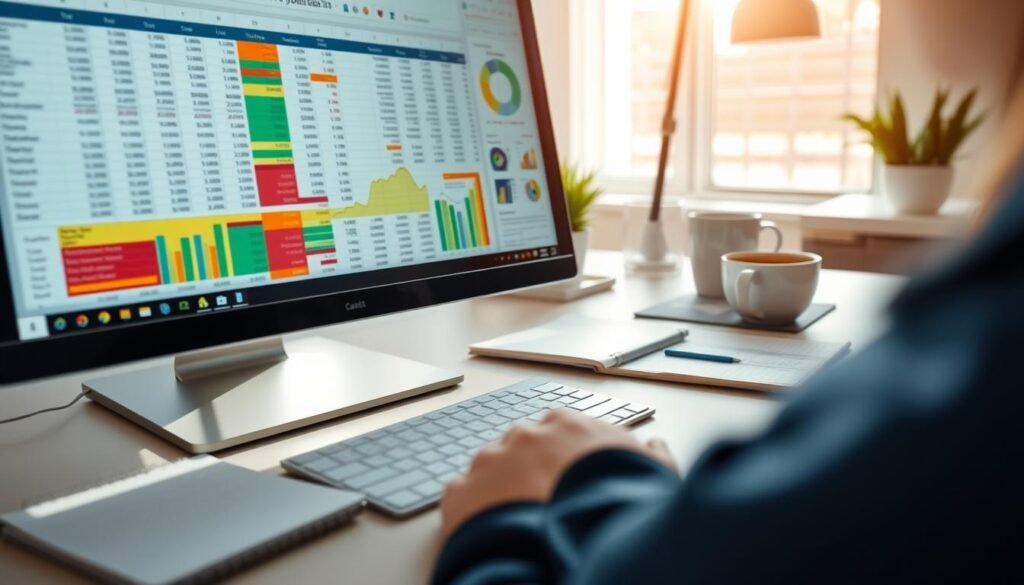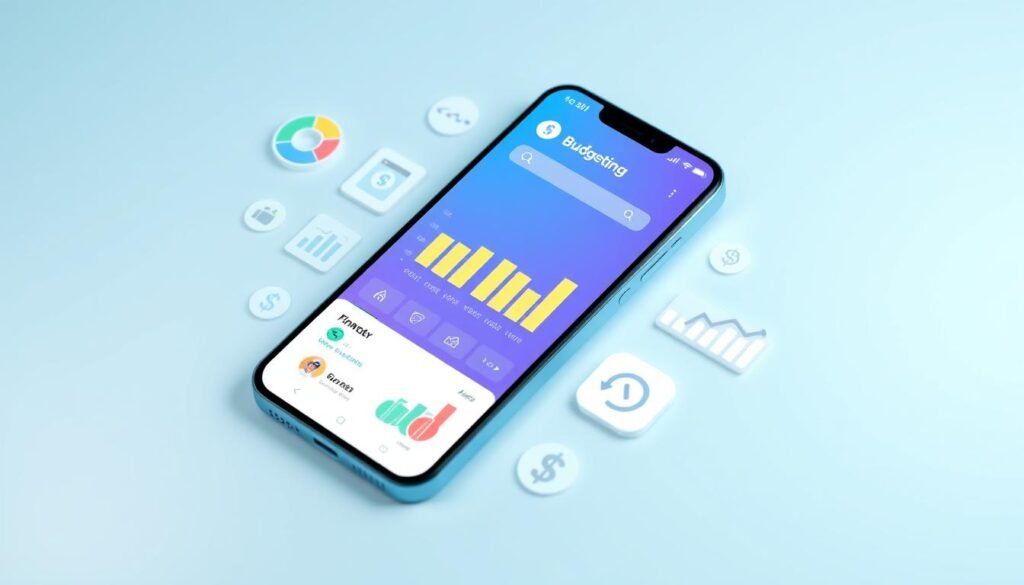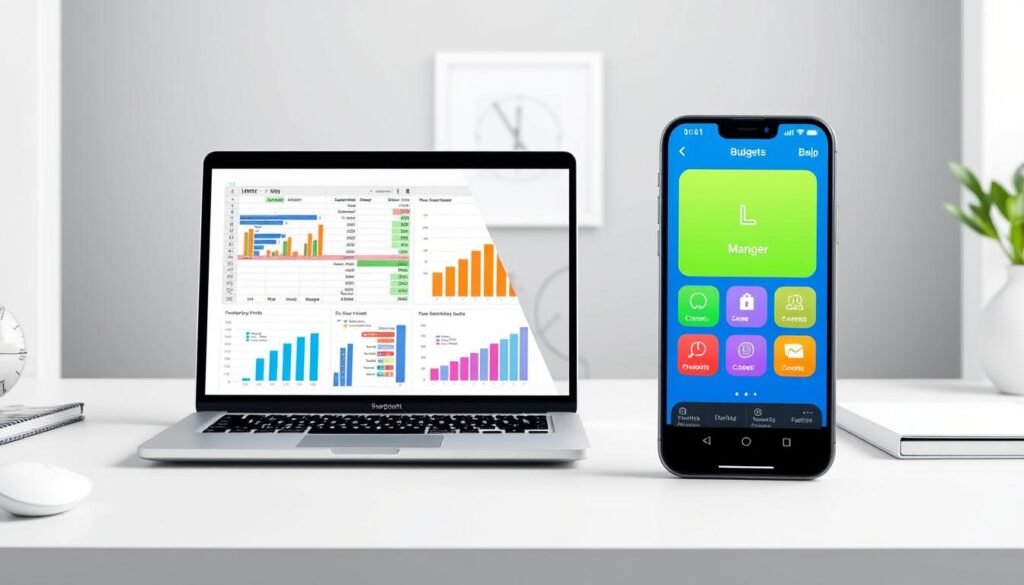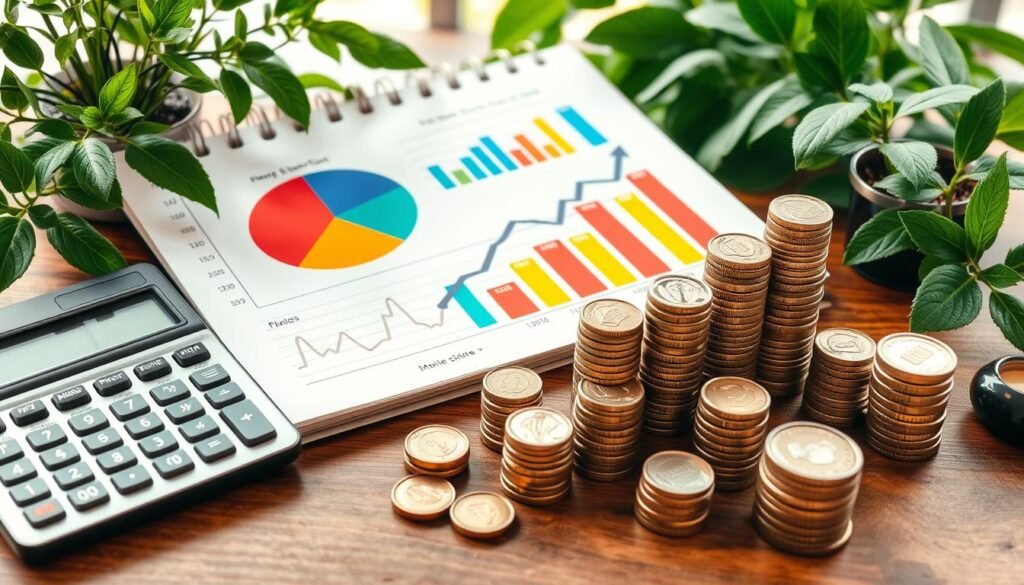Have you ever looked at your bank statement and felt lost? You see all those transactions and wonder where your money went. You’re not by yourself. Many of us find managing money tough. Whether it’s spreadsheets or budgeting apps, picking the right tool is key. This choice is vital for keeping up with your financial aims and staying on budget.
Why is this important? Because being financially well isn’t just about numbers. It’s about feeling calm, free from money stress, and in control of your finances. For a hands-on approach, Google Sheets has been a go-to. For those who like things more automated, apps like Goodbudget and EveryDollar offer smart features. Each option has its perks and downfalls, catering to different tech skills and tracking needs.
With years of budget management under its belt, Goodbudget has guided millions. It does this through both its free and paid plans. Google Sheets, known for its customization, offers a budgeting solution without cost. It’s popular in many fields. As we delve into spreadsheet versus app budgeting, we’ll look at each option. Our goal is to help you choose the best tool for your financial planning needs.
Table of Contents
ToggleKey Takeaways
- Choose the right tool based on your financial goals and familiarity with technology.
- Budgeting apps like Goodbudget offer ease and advanced features, aiding millions in budget management.
- Customizable spreadsheets like Google Sheets offer a free, flexible alternative for detailed tracking.
- Consider the cost and accessibility of budgeting tools to find a solution that fits your budget.
- Both methods can help you achieve financial wellness and reduce stress over money management.
Introduction to Personal Finance Management
Effective personal finance management starts with picking the right tools. You can manage your budget and expenses with spreadsheets or budgeting apps. Each has benefits to help manage your finances.
For manual control lovers, software like Microsoft Excel or Google Sheets is great. You can create budgets, track spending, and plan to pay off debts. These tools let you manage various financial needs, from monthly budgets to event planning.

On the other hand, budgeting apps like Mint and YNAB offer features like goal tracking. They help in saving and investing for a secure financial future. These apps make managing money easier.
Both spreadsheets and budgeting apps work with the 50/20/30 budget rule. It’s essential to pick the method that suits your lifestyle. This ensures you manage your finances well and make smart choices.
Keeping track of income and expenses is vital for financial health. You can customize your budgeting method with different techniques. This flexibility helps in managing your budget over time. We will dig into using spreadsheets and apps for better money management.
How Spreadsheet Budgeting Works
Spreadsheet budgeting lets people tailor their financial plans. It’s great for those skilled in spreadsheet apps, allowing for personalized budgets. These tailored budgets help track and manage personal finances effectively.

Customization and Flexibility
Spreadsheet budgeting stands out for its customization. It lets users change templates to suit their needs. This detailed setup helps in analyzing spending and planning finances.
Unlike pre-made financial software, spreadsheets let you explore different financial what-ifs. They support making well-informed financial decisions.
Cost and Accessibility
Spreadsheets are also cost-effective for budgeting. Tools like Microsoft Excel or Google Sheets are often free or already included in other packages. This means everyone can use them, no matter their budget.
They work on many devices, offering easy access to your budget. This option beats needing specific financial software.
For those who want an easy digital budget tool, EveryDollar is top-notch. The comparison shows spreadsheets are cost-effective and highly customizable.
Longevity and Stability
Spreadsheets are also valued for their long-standing reliability in financial planning. They have been around for years, offering a solid base for monitoring finances. They’re perfect for long-term financial goals and tracking your investments.
It’s important to understand the pros and cons of different budgeting tools. While spreadsheets are reliable and versatile, tools like EveryDollar bring features suited for various needs.
In short, spreadsheet budgeting is loved for its ability to be customized, its affordability, and its reliability. These qualities keep it popular among experienced budgeters.
Benefits of Budgeting Apps
Budgeting apps make managing money easier with a user-friendly interface and rapid setup. These digital budgeting solutions offer advanced features. They make tracking expenses and financial planning simpler.
Ease of Use and Setup
Budgeting apps are easy to use. For example, EveryDollar has free and premium versions. Users can quickly make unlimited budget categories and track expenses. The premium version connects to multiple financial accounts and gives custom budget reports.
On-the-Go Convenience
Budgeting apps let you manage finances anywhere, anytime. Apps like EveryDollar come with expense tracking tools. They set up sinking funds and track savings goals on mobile devices. This access means you can keep up with your budget, at home or traveling.

Advanced Reporting Features
Budgeting apps offer advanced reporting features. EveryDollar has tools like paycheck planning and net worth projection. The premium version lets users export data and set bill reminders. These features offer a detailed view of your finances, combining various accounts in one spot.
| Feature | EveryDollar Free | EveryDollar Premium |
|---|---|---|
| Unlimited Budget Categories | Yes | Yes |
| Custom Budget Reports | No | Yes |
| Connect Multiple Financial Accounts | No | Yes |
| Export Transaction Data | No | Yes |
| Paycheck Planning | Yes | Yes |
| Track Savings Goals | Yes | Yes |
EveryDollar helps you meet major financial goals. It shows why budgeting is key in personal finance. The app lets you match spending with goals by checking progress regularly.
Comparing Budgeting with Spreadsheet vs App
Choosing between budgeting with spreadsheet vs app means thinking about what you need. Think about how you like to manage your money. Some prefer apps for quick checks, while others like the detail of spreadsheets.
Spreadsheets, like Microsoft Excel, let you be very creative. You can make your own rules, set your designs, and change it as you like. For those who love details and control, this is perfect. Also, spreadsheets often cost less over time than some apps.
Budget apps, such as EveryDollar by Ramsey Solutions, offer different benefits. With EveryDollar, you can link your accounts and see your spending automatically. It also gives you budget reports and advice from experts on demand. These apps make tracking your money easier without needing to input everything yourself.
Whether spreadsheets or apps are better depends on what you prefer. EveryDollar’s app is great for keeping an eye on your money easily from anywhere. It’s ready when you are and focuses on what’s important to you. Plus, using an app means less manual work for tasks like splitting costs or saving for goals. Check out cost tracking methods for more info.
From a business view, Excel might be all you need for simple tasks. But if your company’s finances get complicated, an online tool might work better. Software for Financial Planning and Analysis (FP&A) offers more, especially for bigger businesses that need to see the big picture.
In the end, choosing between budgeting with spreadsheet vs app is up to you. Both have their strong points. Finding the best one for you can really help with keeping track of your money.
Expense Tracking with Spreadsheets
Using spreadsheets for budgeting lets you make custom budget templates. This means you can adjust your budget sheets to track your money just the way you need. With tools like Microsoft Excel and Google Sheets, you can design templates that keep track of all your money matters. This is a big plus that many budgeting apps can’t offer.
Creating Custom Budget Templates
Google Sheets gives you free monthly and annual budget templates, making it easy to start tracking your finances. Tiller adds to this by linking your spreadsheet to your bank for a 30-day trial. This way, you can see how it automatically brings in your spending data. Vertex42 also provides many free worksheets that work with Excel and Google Sheets. So, whether you’re handling daily costs or saving for something big, you can set up your budget spreadsheet to track everything accurately.
Manual Data Entry and Analysis
While spreadsheets need you to enter data by hand, this effort pays off. It helps you really understand how you spend your money and see your financial health clearly. The Consumer Financial Protection Bureau (CFPB) suggests using spreadsheets for precise money tracking. Entering details yourself lets you analyze your spending and earnings closely, finding ways to save or adjust your budget.
With the PearBudget’s analysis tab or Microsoft’s detailed templates, you can sort and see your data in helpful ways. This improves your grasp on your finances. For those who fancy innovative tracking but value the solid foundation of spreadsheets, digging into these templates and methods brings both control and insight.
FAQ
What are the main advantages of using spreadsheets for budgeting?
Spreadsheets let you tailor detailed budget templates for your financial needs. They’re typically free and good for tracking expenses over time.
How do budgeting apps simplify the budgeting process?
Budgeting apps make things simpler and faster with easy interfaces. They’re great for tracking on the move. They also have advanced features for spending analysis.
Which method, spreadsheets or budgeting apps, is better for users with a busy lifestyle?
For those always on the move, budgeting apps are better. They offer convenience and automated features for quick finance checks.
Are there cost benefits to using spreadsheets over budgeting apps?
Spreadsheets are often free via Microsoft Excel or Google Sheets. Though apps may have free versions, their premium features cost money.
Can spreadsheets provide the same level of financial insight as budgeting apps?
Spreadsheets can give deep financial insights with custom templates and analysis. This approach helps understand your money better.
Do budgeting apps offer features that spreadsheets do not?
Yes, budgeting apps have features like advanced reports, real-time alerts, and bank account integration. These aren’t usually in spreadsheets without extra tools.
How does manual data entry in spreadsheets impact financial tracking?
Manual entry in spreadsheets takes time but allows full data control. It leads to precise tracking and a solid grasp of finances.
What should I consider when choosing between a spreadsheet and a budgeting app?
Think about what you need in terms of customization, ease, and insights. Choose spreadsheets for in-depth analysis and control. Opt for apps if you value convenience and automated tracking.
Source Links
- Budget app vs. budget spreadsheet. Which is best for you? – https://goodbudget.com/blog/2022/05/budget-app-vs-budget-spreadsheet-which-is-best-for-you/
- Budget Spreadsheets vs. EveryDollar: Which Is the Better Way to Budget? – https://www.ramseysolutions.com/budgeting/quit-using-spreadsheets?srsltid=AfmBOopaOoGB32O-9spzKw0kbsKXXg4cbxlAQr0ct6wQCSG9dl4hMFmx
- Budget Apps vs. Spreadsheets: What’s the Difference? – https://www.fool.com/the-ascent/personal-finance/articles/budget-apps-vs-spreadsheets-whats-the-difference/
- Mastering Personal Finance with Spreadsheets – FormulasHQ – https://formulashq.com/mastering-personal-finance-with-spreadsheets/
- 2024 Best Budgeting Template Spreadsheets, Tools, Apps (expert picks) – https://www.iwillteachyoutoberich.com/best-budgeting-spreadsheets-and-tools/
- Beginner’s Guide To Using Excel For Personal Finance Budgets – https://medium.com/@LearnCourses/beginners-guide-to-using-excel-for-personal-finance-budgets-df5239f94f9a
- Budget Spreadsheets vs. EveryDollar: Which Is the Better Way to Budget? – https://www.ramseysolutions.com/budgeting/quit-using-spreadsheets?srsltid=AfmBOor106_NowcXRaWSgbTc17Lv9iSza0zR1mI_ALikleYx31lae2HQ
- Manage your household budget in Excel – https://support.microsoft.com/en-us/office/manage-your-household-budget-in-excel-6b30a89b-b5ff-4cfe-944f-a389a40c3174
- Free Budget Spreadsheets and Templates – NerdWallet – https://www.nerdwallet.com/article/finance/free-budget-spreadsheets-templates
- Budget Spreadsheets vs. EveryDollar: Which Is the Better Way to Budget? – https://www.ramseysolutions.com/budgeting/quit-using-spreadsheets?srsltid=AfmBOorfBf5yjJmSLwnJMqJcYNjRuku6kpemZ4ZUkrjoIUgnCI0HijDN
- Are Budgeting Apps Worth It? – https://www.forbes.com/advisor/banking/are-budgeting-apps-worth-it/
- Budget Spreadsheets vs. EveryDollar: Which Is the Better Way to Budget? – https://www.ramseysolutions.com/budgeting/quit-using-spreadsheets?srsltid=AfmBOorn9ToOnjDa3tsOK8jzjxhWjPiXP3qF2AGwyHhA9GY_py1yZkBV
- Excel-based vs web-based budgeting and forecasting – https://www.phocassoftware.com/resources/blog/budgeting-software-vs-excel
- Compare Checkbook Software vs Budget Software – https://www.buyexceltemplates.com/pages/compare-checkbook-software-vs-budget-software?srsltid=AfmBOopXkgLiLd7duxvx14R5K2NL7lBVH98uGi4xq9uJo5ltae09AD5j
- Budget Spreadsheets vs. EveryDollar: Which Is the Better Way to Budget? – https://www.ramseysolutions.com/budgeting/quit-using-spreadsheets?srsltid=AfmBOorwicHCSTjVrLkvQZ9exu3u0SauBD80dH9P5BlVki8mBXcLq3DE
- The Best Budget Spreadsheets – https://www.thebalancemoney.com/free-budget-spreadsheet-sources-1294285
- Budgeting Apps vs. Spreadsheets: Which is the Best Tool for Managing Your Finances? Budgeting Apps vs. Spreadsheets: Which is the Best Tool for Managing Your Finances? – https://www.burtonwealth.com/blog/budgeting-apps-vs-spreadsheets-which-best-tool-managing-your-finances



